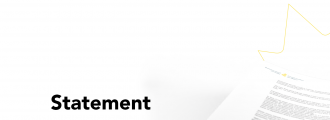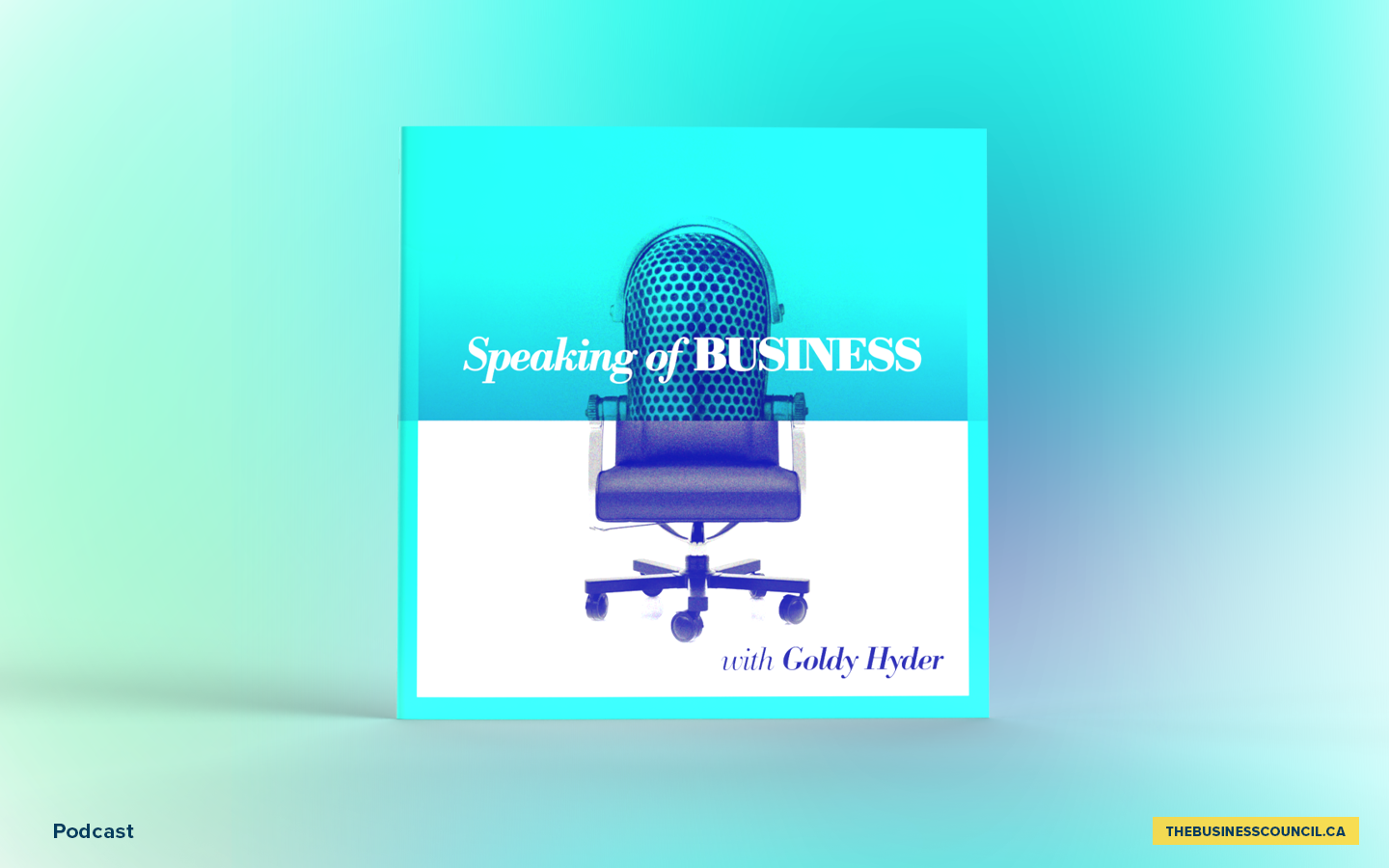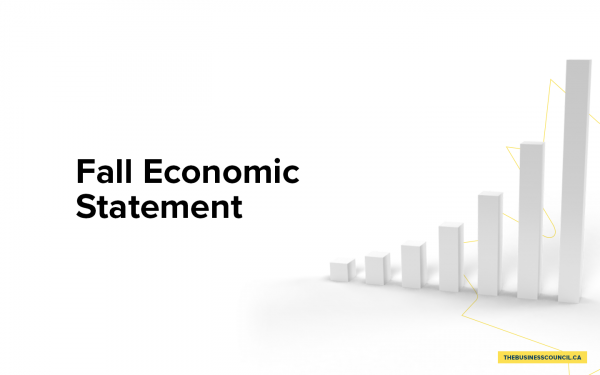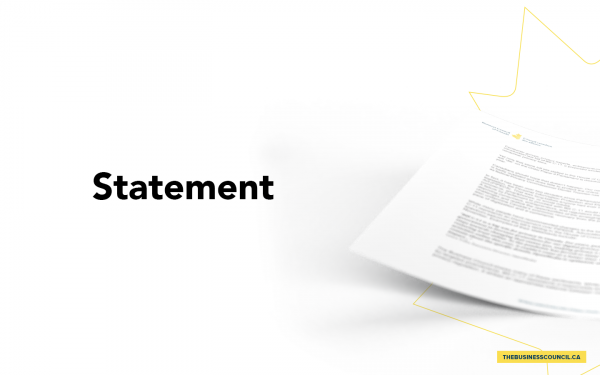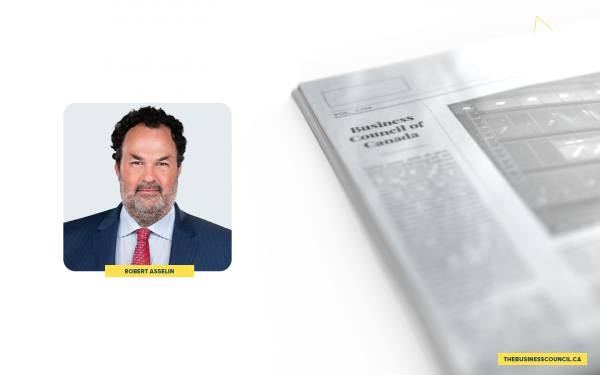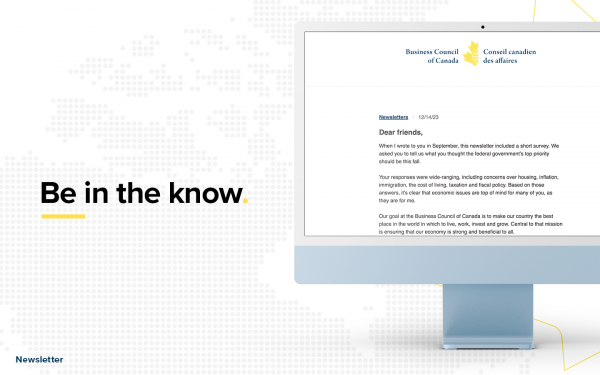I think it’s time for us all to reflect
In light of the COVID-19 emergency, we’ve temporarily suspended our regularly scheduled series of conversations with Canadian CEOs. But we’re not going away. Instead, we’re going to pivot to the health emergency itself. We’re going to explore the impact on companies and workers across the country. And we’re going to find out how business leaders are responding to crisis.
Tabatha Bull, President & CEO of the Canadian Council for Aboriginal Business discusses the impact of the federal government’s wage subsidy plan, the unique challenges faced by indigenous companies during the pandemic and what we can learn from elders during a time of crisis.
Latest Podcasts
Transcript
Goldy Hyder:
Hi, I’m Goldy Hyder at the Business Council of Canada and you’re listening to a special episode of Speaking of Business. Conversations with Canadian innovators, entrepreneurs, and business leaders.
Goldy Hyder:
During the COVID 19 pandemic, we’re reaching out to Canadian CEOs to find out how businesses across the country are being affected by the emergency and how they as leaders are responding. Our first three episodes featured Michael McCain of Maple Leaf foods, Dax Dasilva of Lightspeed, and Stephen Liptrap of Morneau Shepell. You can listen to all three of those wherever you find podcasts or of course visit our site, speakingofbiz.ca. That’s biz with a z.
Goldy Hyder:
My guest today is Tabatha Bull, newly appointed president and chief executive officer of the Canadian Council for Aboriginal Business. The council’s mission is to build bridges between Aboriginal and non-Aboriginal peoples, businesses and communities across Canada. Welcome Tabatha.
Tabatha Bull:
Thank you. Thanks for having me.
Goldy Hyder:
Well, thank you for making the time and for your leadership. I mentioned you’re newly appointed CEO, but you’ve of course been with the organization for a while and we’ve had a chance to work together and I want to thank you for that collaboration.
Tabatha Bull:
Thank you. It has been great.
Goldy Hyder:
Well let’s dig in. Of course, we’re in these unprecedented times and I’m wondering whether you could shed some light for our listeners on what are the unique challenges that Aboriginal businesses are facing at this time that perhaps others aren’t?
Tabatha Bull:
So definitely we are seeing some unique challenges. Aboriginal businesses, one of the biggest challenges that they face is access to capital and financing. Around 20% actually use traditional banking. So definitely access to capital and liquidity, similar to other businesses, but without having that direct access to a financial institution or a relationship, that has been a bit of a unique concern.
Goldy Hyder:
That’s an amazing stat. 20% you said only use sort of traditional banking? What do the other 80% do?
Tabatha Bull:
So for private businesses, some are definitely funded through the Aboriginal financial institutions across the country, but a number of small businesses are funded through personal savings or retained earnings. So that definitely provides a difficult cashflow situation for a number of those.
Goldy Hyder:
Yeah, that would be a real stretch these days I would imagine given the lack of revenues coming in.
Tabatha Bull:
Yes, exactly. So we are working with the financial institutions and BDC and EDC to see how we can help make those connections a little bit stronger.
Goldy Hyder:
And what’s your sense been in terms of how the federal government and those programs, EDC and BDC in particular, have been able to address the gap?
Tabatha Bull:
So we’re having regular conversations with federal government and finance on how we can make sure that we can help assist in making those connections. And both BDC and EDC have been good partners of CCAB. So we’re working quite closely with them and I think we’re going to be able to come to a solution that will definitely help. We’re not quite there yet, but as we all know, things are changing very quickly every day.
Goldy Hyder:
Yeah. This must be a real challenge in terms of juggling the relationships with governments and businesses and stakeholders at the same time. Certainly I’m feeling that way.
Tabatha Bull:
It definitely has been very busy first two weeks.
Goldy Hyder:
All right, well look, one of the other issues in addition to financing and liquidity that you spoke about, that is occurring in, and it’s common, it’s not restricted to any one business, but the issue of supply chains. I can only imagine that the issue of supply chains for businesses that are in remote regions are even more reliant on there being some consistent definitions of what are essential services and the use of the guidance being given to how these goods can be moved. What are you hearing? What are you feeling about supply chains for these businesses and particularly, in your case, the Aboriginal businesses that are very remote?
Tabatha Bull:
Yeah, so definitely from a rural and remote perspective, we have been pushing to ensure that supply chains not only continue in urban centers, but also to rural and remote. We have been doing an online survey over social media, Indigenous businesses and currently they’re still finding that the biggest impact has been on travel to their businesses and that also from being rural, able to network and build your business without travel is very difficult, but supply chain has been about 13% of what they’re finding as the main impacts to businesses right now.
Tabatha Bull:
The other major impact is definitely infrastructure from a broadband perspective. That’s similar across to rural businesses as well, but specifically if we are working from home and that’s on a First Nation or in a rural setting, it’s a lot more difficult. I think we’re all having trouble with our internet, even in the cities, so that’s been a real challenge for businesses.
Goldy Hyder:
Yeah, there’s no question the usage has probably gone through the roof. I can certainly say in our own home having everybody here, it’s like we literally schedule now who needs to use the wifi.
Tabatha Bull:
Yes.
Goldy Hyder:
It’s a reminder of the essential service that that is and how lucky we are to have had some of the investments that have been made. And I know it’s the case of some company like Telus for example, deep relationships with Indigenous communities on these issues.
Tabatha Bull:
Yes, Rogers we’ve seen has done some great work as well and we have been talking to Indigenous businesses about how we can help them move, particularly those in retail trade to an eCommerce platform, but one of the challenges will definitely be the infrastructure.
Goldy Hyder:
Right. These moments are also revealing, right? They kind of point out where the gaps are and how they can be filled. Then you get a chance to start laying the markers for life after and we know there’s going to be a life after and that things are going to be good again, but hopefully some good comes from all of this as well in terms of being able to address some of these gaps that you’ve identified.
Tabatha Bull:
Definitely. And I think from an optimistic point of view as well, we’ve found that government has been quite proactive and understanding the unique needs and gaps of Indigenous businesses, which in this time, in every crisis, there’s an opportunity. So I think this has been an opportunity for us to really demonstrate what the needs are and to build those strong relationships with corporate Canada as well, for them to look to see what they can do to increase their own supply chains from Indigenous businesses.
Goldy Hyder:
Right. Well I’m encouraged to hear that on all fronts. I think that this is a, that hashtag we’re in this together has never been more true than realizing that we really are in this together and that it’s not whether government knows best or business knows best or stakeholders know best. We all bring something to that table. So I’m really encouraged by what you’re saying.
Goldy Hyder:
And speaking of being encouraged this morning, we’re taping this on the 30th of March here. We had a new announcement from the federal government with respect to the wage subsidy program to keep people employed and make sure that businesses are able to survive during this emergency. We’ve got a lot more detail from the prime minister this morning and our reaction at the Business Council was very positive to what we heard. How do you feel about what you heard?
Tabatha Bull:
Yeah, I’m quite pleased with that announcement as well. I did have some conversations with the federal government about, we need to also look at large businesses, particularly in our case, particularly those who have really shown leadership in employing Indigenous people and how do we ensure that we’re keeping those people employed. And there are some large Indigenous businesses as well that don’t fit in the category that had reached out to me over the weekend said, “We employ a lot of Indigenous people in this area and we need to ensure that we can keep that employment up and not have to instead put the resources into the community.” I think the resources into keeping people employed in the long run will be better for the economy.
Goldy Hyder:
Yeah, I think that’s a really important point. I mean, I am very empathetic to the fact that the government finds itself in an unprecedented situation as drinking from a fire hose and they’ve had to work their way through a number of initiatives and programs. But this is encouraging that they turn their attention to some of these larger businesses now. I think this week will be mostly about that because those supply chains rely on those larger businesses and I think that applies to the Indigenous businesses as much as it does others.
Goldy Hyder:
Now I know that, when we recently spoke, you mentioned that one of the things you’ve started to do is survey your members to kind of keep tabs on what they’re seeing, what they’re hearing, how they’re feeling. Can you just share with our listeners as perhaps a wrap up question to you, but what are you asking them and what sort of responses have you been getting back so far?
Tabatha Bull:
So originally our survey was simpler. We were asking what’s the impact, is it severe or not? And we have had that survey out for about two weeks and we’ve seen from the beginning on March 12th, businesses that are very or somewhat concerned has gone up to 90% from 75, so definitely as this pandemic continues, the impact and the concern of businesses is growing every day. We are putting out a new survey today actually that will ask more specifically around the economic impact that they are feeling and have felt to date and also which businesses have the ability to retool an answer the government’s called a combat COVID 19 and what type of stimulus they would require in order to do that. So we’re really focusing in on how we get those businesses continuity through this.
Goldy Hyder:
Your remarks triggered a couple of other clicks. I’m going to sneak in another couple here if I can, but first of all I’d like to ask you on a very personal level, how has this impacted you or your life in any way?
Tabatha Bull:
Yeah, definitely taking on the CEO role at the same time that we went to remote workforce. Has it been a challenge? For sure. And while we thought without travel maybe we’d have a little bit of extra time, I think we’re all drinking through a fire hose. I’m sure you are as well, but I know we have a staff call every day and our staff is all feeling busier than they ever have been. I will say that we have an incredible team at CCAB and they have adapted so quickly to working remotely and to answering the number of questions that are coming in. Personally, my parents aren’t well and they’re home at Nipissing First Nation and so it’s a bit tough not to be able to see them for sure. I think everybody’s feeling that way. I had hoped to be able to go home and work from my community for this period, but I’ve been advised not to. So that’s a bit tough on the kids for sure.
Goldy Hyder:
Well look, I mean I know you’ve got a great team there. I know you’re going to make for a really successful leader and I wish you and your parents well. I wonder, because you mentioned your parents and I know the role of elders in your community and your culture. What can we learn from the elders in terms of how you manage through a crisis like this? Because it’s certainly not the first one they’ve ever seen. And I think I personally feel that there’s a lot of wisdom that comes from different cultures and different communities. So what can we learn from the elders here?
Tabatha Bull:
I think we can all learn the importance of our elders and we’re all feeling that in knowing that COVID is much more difficult for our elders. So ensuring that we’re focusing on helping them and helping them through this crisis is so important. Because if we lose our elders, we will lose so much in terms of our culture and teachings and art. And I think it’s a time for us all to reflect that we really should be trying to be a sponge to their knowledge and also taking the time to spend time with them. And I think that’s something that is very important in Indigenous culture and maybe all of us are learning the importance of that a little bit more.
Goldy Hyder:
I can’t think of a better place to end than that. That’s wise words and we appreciate you taking the time today, Tabatha.
Tabatha Bull:
Thank you.
Goldy Hyder:
And I want to thank our listeners for joining us for another special episode of Speaking of Business, we’ll be back with some more. Thanks again for listening.




